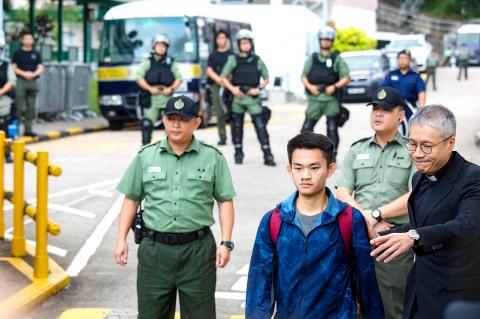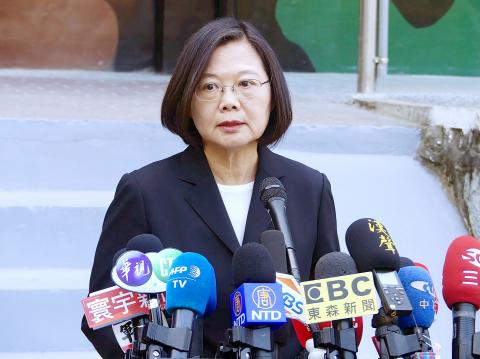Hong Kong murder suspect Chan Tong-kai (陳同佳) is a wanted fugitive, not a backpacker, so he should be arrested and not be allowed to “turn himself in,” President Tsai Ing-wen said yesterday, urging the Hong Kong government not to sidestep the issue.
Chan is suspected of murdering his girlfriend, Poon Hiu-wing (潘曉穎), in Taiwan in February last year.
In April, he was sentenced by a Hong Kong court to 29 months in prison for money laundering after he used Poon’s bank card to make automated teller machine withdrawals.

Photo: Bloomberg
He was released yesterday.
Taiwan would not give up its jurisdiction over the case, and if the Hong Kong government is unwilling to exercise its jurisdiction and seek justice for the victim, then Taiwan would “handle it,” Tsai told reporters at an event in Kinmen County to commemorate the 70th anniversary of the Battle of Guningtou.
Chan is wanted by Taiwan, the president added.

Photo: Wu Cheng-ting, Taipei Times
“In this case, there is no such thing as an issue with an individual backpacking tourist, only arrest,” she said. “There is no issue of surrender.”
Over the past few days, critics have said that the government is “too weak,” or that she does not care about justice, Tsai said.
“Everything we are doing now is serving justice,” she said, adding that the government is also upholding its sovereignty.
The government would continue to ask the Hong Kong government to provide legal assistance, especially in providing important evidence, Tsai said, urging the Hong Kong government not to ignore the requests.
The Mainland Affairs Council (MAC) yesterday issued a statement calling the Hong Kong government’s decision to let Chan travel alone to Taiwan “bizarre.”
The Hong Kong government first gave up its own jurisdiction and then neglected Taiwan’s requests, the council said.
It even proposed letting the suspect travel to Taiwan on an airplane on his own, “completely ignoring the safety of the passengers on the flight just to achieve the political purpose of letting the suspect ‘surrender,’” it said, adding that the territory’s government is “letting Hong Kong turn into a criminal paradise where murderers can travel around.”
The Hong Kong government has said that the suspect is “willing to surrender, meaning if the suspect is unwilling to surrender, the Hong Kong government does not care if he is at large,” the council said.
A responsible government should not let the victim’s family “have nowhere to turn to about the injustice perpetrated against them” it said.
Hong Kong Commercial Broadcasting Co quoted Peter Koon (管浩鳴), an Anglican clergyman, as saying that Chan had originally purchased a ticket to fly to Taiwan yesterday morning.
However, Koon said the plan was canceled because Taiwan did not allow him and Chan to enter the nation, the broadcaster said.
The Hong Kong government yesterday issued a statement saying that Taiwanese authorities have no right to enforce the law in Hong Kong.
After his release from jail yesterday, Chan is a free man and the Hong Kong government has no right to impose any forced measures on him, the statement said.
Chan can choose who accompanies him to Taiwan and Taiwanese authorities can arrest him after he arrives, it said.
If Taiwan is willing to handle Chen’s surrender, it should cancel its restrictions on his entry, it said.
“Since Chen is willingly surrendering, what suspicion is there over [him] escaping or destroying evidence?” it said.
MAC Deputy Minister Chiu Chui-cheng (邱垂正) on Tuesday night said that Taiwan urges the Hong Kong government to think about the potential consequences of setting Chan free.

GAINING STEAM: The scheme initially failed to gather much attention, with only 188 cards issued in its first year, but gained popularity amid the COVID-19 pandemic Applications for the Employment Gold Card have increased in the past few years, with the card having been issued to a total of 13,191 people from 101 countries since its introduction in 2018, the National Development Council (NDC) said yesterday. Those who have received the card have included celebrities, such as former NBA star Dwight Howard and Australian-South Korean cheerleader Dahye Lee, the NDC said. The four-in-one Employment Gold Card combines a work permit, resident visa, Alien Resident Certificate (ARC) and re-entry permit. It was first introduced in February 2018 through the Act Governing Recruitment and Employment of Foreign Professionals (外國專業人才延攬及雇用法),

WARNING: From Jan. 1 last year to the end of last month, 89 Taiwanese have gone missing or been detained in China, the MAC said, urging people to carefully consider travel to China Lax enforcement had made virtually moot regulations banning civil servants from making unauthorized visits to China, the Control Yuan said yesterday. Several agencies allowed personnel to travel to China after they submitted explanations for the trip written using artificial intelligence or provided no reason at all, the Control Yuan said in a statement, following an investigation headed by Control Yuan member Lin Wen-cheng (林文程). The probe identified 318 civil servants who traveled to China without permission in the past 10 years, but the true number could be close to 1,000, the Control Yuan said. The public employees investigated were not engaged in national

ENHANCE DETERRENCE: Taiwan has to display ‘fierce resolve’ to defend itself for China to understand that the costs of war outweigh potential gains, Koo said Taiwan’s armed forces must reach a high level of combat readiness by 2027 to effectively deter a potential Chinese invasion, Minister of National Defense Wellington Koo (顧立雄) said in an interview with the Chinese-language Liberty Times (sister newspaper of the Taipei Times) published yesterday. His comments came three days after US Secretary of State Marco Rubio told the US Senate that deterring a Chinese attack on Taiwan requires making a conflict “cost more than what it’s worth.” Rubio made the remarks in response to a question about US policy on Taiwan’s defense from Republican Senator John Cornyn, who said that Chinese

The zero emissions ship Porrima P111 was launched yesterday in Kaohsiung, showcasing the nation’s advancement in green technology, city Mayor Chen Chi-mai (陳其邁) said. The nation last year acquired the Swiss-owned vessel, formerly known as Turanor PlanetSolar, in a bid to boost Taiwan’s technology sector, as well as ecotourism in Palau, Chen said at the ship’s launch ceremony at Singda Harbor. Palauan President Surangel Whipps Jr and Minister of Foreign Affairs Lin Chia-lung (林佳龍) also attended the event. The original vessel was the first solar-powered ship to circumnavigate the globe in a voyage from 2010 to 2012. Taiwan-based Porrima Inc (保利馬) installed upgrades with